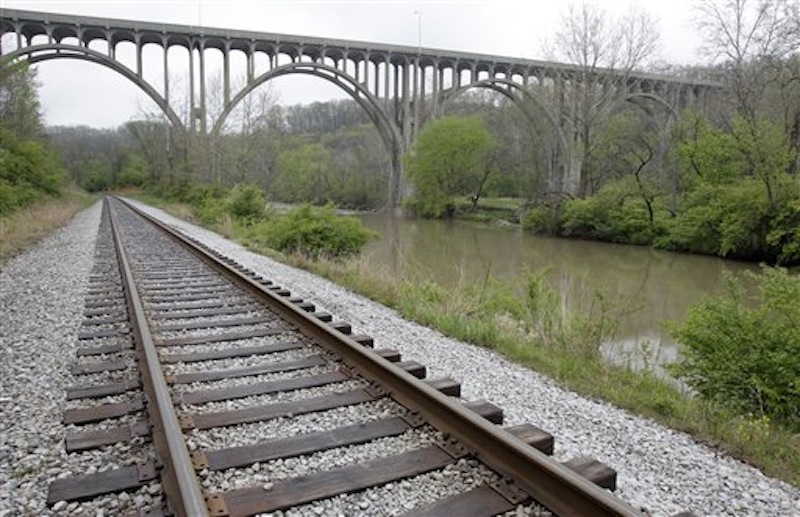CLEVELAND — An attorney representing one of five defendants in an alleged conspiracy to blow up an Ohio bridge questioned the role of an undercover informant, saying the ex-con hired by the FBI appeared to have played an active role in the plot.
Cleveland defense lawyer John Pyle also said Wednesday that the case could be one of “the tail wagging the dog.” He said his client, Brandon Baxter, will plead not guilty in the case, which is set for a preliminary hearing next week.
Much of a 22-page FBI affidavit outlining the charges was based on the work of an undercover operative who has drug, robbery and bad check convictions.
“We need to get the discovery and put the case under a microscope,” Pyle said. “But just on the basis on the filing in the court, there’s some indicators that this informant was playing a really active role.”
An attorney for a second defendant, Douglas Wright, said his client also will plead not guilty.
Three other men also are accused of trying to detonate what they thought were real explosives with text messages.
The attorney for defendant Anthony Hayne said the only information he had about the defendant came from the affidavit.
“I have no idea who it is at this point,” Michael O’Shea said Wednesday of the informant. “I imagine they will work pretty hard to keep that from us as long as they can.”
The five men were charged Tuesday with plotting to bomb a bridge linking two wealthy Cleveland suburbs by placing what they thought were real explosives at the site and repeatedly trying to detonate them using text messages from cellphones, according to the FBI affidavit.
Federal authorities described the men as anarchists who are angry with corporate America and the government and unknowingly worked with an FBI informant for months as they crafted and carried out their plan.
The FBI said the suspects bought the explosives — actually fake — from an undercover employee and put them at the base of a highway bridge over the Cuyahoga Valley National Park, about 15 miles south of downtown Cleveland, on Monday. After leaving the park, they tried to initiate the explosives using a text-message detonation code, and they called the person who provided the bombs to check the code when it failed, according to the FBI affidavit.
Their arrests that night marked the latest case in which FBI agents or informants planned fake terrorism plots alongside targeted suspects.
Court documents detail conversations the FBI secretly recorded in which its informant discussed bomb plans with some of the suspects. In one, Baxter, 20, of Lakewood, allegedly said, “Taking out a bridge in the business district would cost the … corporate big wigs a lot of money” because it would cause structural damage and prevent people from going to work.
The alleged conversations depict Wright, 26, of Indianapolis, as a sort of group leader who recruited others, scouted out the bridge site and participated in buying the fake explosives.
The other suspects were identified as Joshua S. Stafford, 23, and Hayne, 35, both of Cleveland, and Connor Stevens, 20, of suburban Berea.
All five are charged with conspiracy and trying to bomb property used in interstate commerce. They appeared Tuesday in U.S. District Court and were ordered jailed without bond pending a hearing Monday.
The charges carry possible penalties of more than 20 years in prison.
Send questions/comments to the editors.




Success. Please wait for the page to reload. If the page does not reload within 5 seconds, please refresh the page.
Enter your email and password to access comments.
Hi, to comment on stories you must . This profile is in addition to your subscription and website login.
Already have a commenting profile? .
Invalid username/password.
Please check your email to confirm and complete your registration.
Only subscribers are eligible to post comments. Please subscribe or login first for digital access. Here’s why.
Use the form below to reset your password. When you've submitted your account email, we will send an email with a reset code.